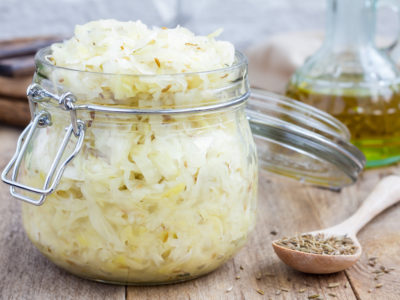Table of Contents[Hide][Show]
The more we learn about the gut microbiome, the more we realize the need for beneficial bacteria in our lives. The best way to improve our body’s bacterial balance is by incorporating fermented foods into our diet. There are many to choose from and each one contains different strains or cultures of these friendly flora.
Why Are Fermented Foods Good For Us?
The fermentation process occurs when naturally present bacteria and yeasts in the raw foods consume the sugars or starches in the foods and produce organic acids; most notably, lactic acid. These foods are often referred to as lacto-fermented.
Fermentation preserves the food, creates beneficial enzymes and vitamins, and makes food more digestible. It is also what gives it that delicious tang that we enjoy so much! (Well, some of us, anyway… 🙂
Fermented foods contain huge amounts of beneficial probiotics that help play important roles in our digestion of foods and in our bodies. They are also very big players in our immune systems because they are protective in the gut, where over 80% of your immune system is housed.
Benefits of Fermented Foods
Here are some more benefits associated with fermented foods:
- They help preserve good pH balance in the body
- Act as natural antiobiotics, antivirals, and even antifungals
- Increase omega-3 fatty acids, lactase, and others that fight off harmful bacteria
- Control inflammation
- Free up certain vitamins from your food like vitamins A, C and K, as well as B vitamins, so your body can absorb them much easier
- Slow the aging process
- Improve brain function and health
- Increase bioavailability of mood-regulating B vitamins, magnesium and zinc (see study)
- Support great cardiovascular health
- Strengthen bones and teeth
- Fight (and protect from) bacterial and fungal infections such as salmonella and candida
- Boost energy levels
- Very budget-friendly if you produce them at home!
Do’s And Don’ts
Generally speaking, fermented foods are a very beneficial part of a healthy diet and lifestyle. But there are a few things to consider before diving into the world of fermented foods.
If you are new to them, especially if you have been eating a standard American diet (the SAD – high in carbohydrates and processed foods) then you may need to consult with a qualified practitioner before you start trying them out. The SAD promotes leaky gut, dysbiosis (unbalanced gut bacteria levels) and also a condition known as SIBO – small intestine bacterial overgrowth. If you have digestive complaints, or any chronic health problems, we advise you to seek advice first.
Do be aware that commercially available pickles, sauerkraut and vinegars are often made with undesirable additives like firming agents, sugar and flavorings, that may or may not be naturally derived, among others. Also, more often than not, they are pasteurised and so do not contain any live probiotics (so the pickle in your burger doesn’t count, sorry!). Even if the ingredients show no more than cabbage and salt for a jar of sauerkraut, that doesn’t mean it wasn’t pasteurised before bottling. If you want to be sure you are getting the benefit of truly live fermented foods, it’s best (and easier and cheaper!) to make them at home.
Don’t rely on store-bought probiotic capsules. Only a few brands can prove the efficacy in actually delivering live bacteria to your colon (where they live mostly) and even then it can be really hard to get the right balance of bacteria depending on your needs. Your microbiome is unique to you, just like your fingerprints.

Top Fermented Foods
There are literally hundreds of traditional fermented foods to try out, and multitudes of recipes online for you to choose from. Once you understand the basic principles for preparing fermented foods, and you discover what you like and don’t like, you then have the freedom to play around with different flavors, additions, duration of fermentation and so on. Here’s a list of some of the most popular varieties that have super nutritional benefits:
1. Kefir
Kefir (pronounced keh-fear) is either a milky, yogurt-like drink or a slightly sweet and lightly fizzy water drink.
Kefir can either be made from dairy milks or coconut milk, or from sugar water or fruit juices, and they come from different strains of starter culture in the form of kefir grains. You can use dairy kefir grains to ferment coconut milk, but you will need to refresh them in dairy milk every few batches. You cannot use dairy kefir grains to produce water kefir, or vice versa. They are two different species and have different strains of bacteria and yeasts present.
Water kefir contains fewer strains of bacteria and yeasts than dairy kefir (around 10 -15 for water kefir vs up to 50 for dairy kefir). There is a certain strain of yeast that can make dairy kefir cultures problematic for certain people; particularly those with autoimmune disease. The specific strain is streptococcus thermophilus and is present in yoghurt and dairy kefir, even if made with coconut or other nut milks.
But many folks who cannot tolerate dairy do very well with kefir because the beneficial microbes consume the sugars in the milk that are the most common cause for intolerance to dairy.
2. Sauerkraut
Sauerkraut is a tangy, salty and slightly chewy shredded cabbage dish.
Lacto-fermented cabbage made with salt and sometimes a whey starter culture, sauerkraut is very beneficial for the whole digestive tract. It contains plenty of good fibre, many vitamins and minerals including some hard-to-come-by manganese, iron, calcium and vitamin K and is very healing for inflammatory conditions in the body. It is also said to improve your vision!
To make sauerkraut, all you need are cabbage, salt, and caraway seeds, but you could add other ingredients if you wish. Place all ingredients in a jar and let sit at room temperature to ferment for 2-4 weeks. For more information, check out this post for a detailed sauerkraut recipe.
3. Kombucha
Kombucha a slightly sweet fermented tea with many variations on flavor possible.
Kombucha can be made with any of the common sinensis tea varieties, such as black tea, green tea or white tea, and a sugar solution. A SCOBY (symbiotic culture of bacteria and yeasts) is the fermentation culture, a disc-shaped mushroom-y culture that consumes the sugars in the tea and produces the beneficial probiotic organisms.
4. Real Veggie Pickles
Pickles can be sweet or sour and the most commonly pickled veggie is cucumbers.
Like sauerkraut, pickles contain plenty of hard-to-come-by vitamin K, as well as the whole kaboodle of vitamins, minerals and probiotics in various proportions depending on the type of vegetable you choose. Pickles are especially good for pregnant women (that’s probably why you’ll see her munching on them at midnight!) because they help to provide the baby with a strong immune system and healthy brain.
5. Kimchi
Kimchi is a spicy, tangy Korean staple made from veggies like cabbage, peppers, chili, and fish sauce.
This one may take some getting used to, but it’s known for all the usual benefits as well as being especially good for clearing out pathogens from the digestive tract. However, if you are sensitive to nightshades or spicy foods, then you may want to take a rain check on this one…
6. Tempeh
Tempeh is made from fermented soybeans that are formed into a cake-like product.
Tempeh’s neutral, slightly nutty flavor makes it very versatile and good at absorbing other flavors. It serves as a good substitute for bacon in BLTs or as an addition to a bowl of steamed vegetables. Just grab some soybeans and a tempeh starter, and you’re good to go. To prepare tempeh, follow this recipe.
Go Shopping!
So, most of these should be easy enough to find to try them out and see what you think. Don’t be surprised if it takes a few tries before you get used to the tastes (and don’t be surprised if your body starts asking for it!) If you can’t find any that aren’t pasteurized, don’t be frightened to make your own.
Sources:
- https://draxe.com/fermented-foods/
- https://wellnessmama.com/2245/health-benefits-fermented-foods/
- http://www.thehealthyhomeeconomist.com/water-kefir-versus-milk-kefir/
- http://bodyecology.com/articles/woman_needs_to_know_have_a_baby.php
You May Also Like…




